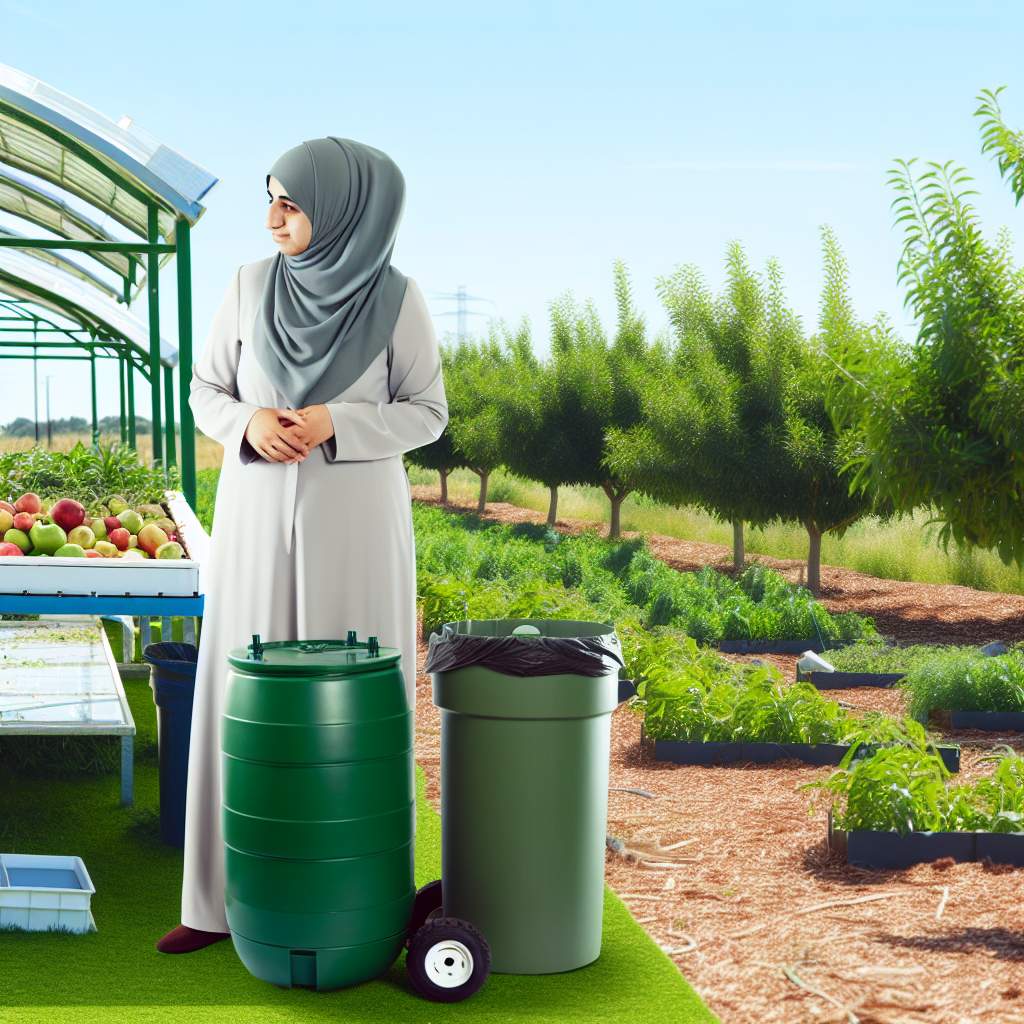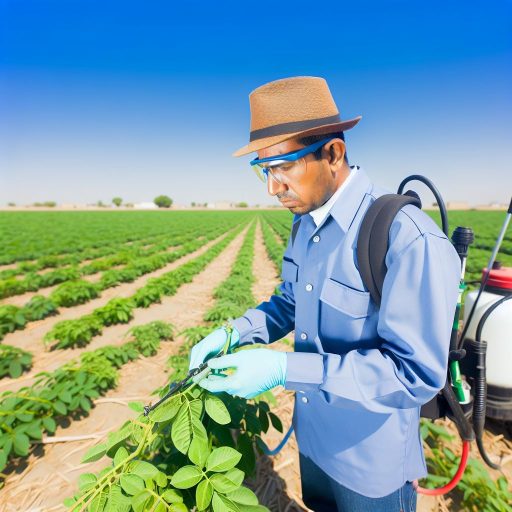Introduction:
Sustainable practices are crucial for farming as they help conserve resources and protect the environment.
Farm managers play a key role in implementing these practices to ensure long-term viability.
In this blog post, we will discuss various sustainable practices that farm managers can adopt to improve their operations and reduce their environmental impact.
Importance of sustainable farming practices:
Sustainable farming helps preserve soil quality by reducing erosion and improving fertility.
It promotes biodiversity by creating habitats for beneficial insects and wildlife on the farm.
Reducing pollution is crucial. Sustainable practices minimize the use of chemical fertilizers and pesticides that can harm the environment.
Water resources are conserved through practices like rainwater harvesting and efficient irrigation methods.
Sustainable methods help combat climate change. For example, sequestering carbon in the soil through cover cropping is effective.
Implementing sustainable practices on a farm has economic advantages as well.
Profitability increases over the long term when input costs associated with chemicals are reduced.
Soil health improves, resulting in higher crop yields and better quality produce for sale.
New market opportunities arise for organic and sustainably produced crops, commanding premium prices.
Diversification reduces the risk of crop failure due to extreme weather events or pest outbreaks.
A farm’s resilience to environmental challenges is enhanced, ensuring the long-term sustainability of the operation.
Reducing Chemical Inputs in Farming
One of the key ways farm managers can practice sustainability is by reducing chemical inputs.
Tips for Reducing Chemical Inputs:
- Integrated Pest Management (IPM): Implement a holistic approach to pest control that focuses on prevention and uses natural predators to manage pests.
- Crop Rotation: Rotate crops to prevent the build-up of pests and diseases, reducing the need for chemical treatments.
- Companion Planting: Planting different crops together can help control pests naturally and reduce the need for chemical pesticides.
- Organic Fertilizers: Use compost and other organic materials to replenish soil nutrients instead of synthetic fertilizers.
- Soil Testing: Regularly test soil to determine nutrient levels and avoid over-application of fertilizers.
Alternative Methods to Chemical Inputs:
- Cover Cropping: Planting cover crops can help improve soil health, reduce erosion, and suppress weeds, minimizing the need for chemical inputs.
- Beneficial Insects: Introduce beneficial insects like ladybugs and lacewings to control pest populations naturally.
- Crop Residues: Leave crop residues on the field to improve soil structure and fertility, reducing the need for chemical fertilizers.
- Crop Diversification: Grow a variety of crops to promote biodiversity and reduce the risk of pest outbreaks that require chemical treatments.
- Biological Control: Implement biological control methods such as releasing predatory insects to manage pest populations without chemicals.
By following these tips and utilizing alternative methods, farm managers can significantly reduce their reliance on chemical inputs.
Embracing sustainable practices benefits the environment and the long-term viability of the farm.
You Might Also Like: Understanding Collateral in Agricultural Loans
Conservation of Natural Resources
Conserving water and soil on the farm is crucial for sustainable practices.
Long-term success depends on ensuring that these resources are used efficiently.
Transform Your Career Today
Unlock a personalized career strategy that drives real results. Get tailored advice and a roadmap designed just for you.
Start NowIt is essential to preserve them for future generations.
Importance of Conserving Water
Water is a precious resource that is essential for all life forms.
This includes plants, animals, and humans.
In agriculture, water is needed for irrigation, livestock, and various farm operations.
By conserving water, farm managers can ensure a reliable supply for their crops.
They can also reduce costs associated with water usage.
Importance of Conserving Soil
Soil is the foundation of agriculture, providing nutrients and support for plant growth.
Healthy soil is essential for productive crops and sustainable farming practices.
By conserving soil, farm managers can prevent erosion.
They can also maintain soil health and preserve the productivity of their land.
This is important for future generations.
Strategies for Efficient Water Management
- Implement drip irrigation systems: Drip irrigation delivers water directly to the roots of plants.
- Utilize rainwater harvesting: Collecting rainwater in storage tanks can provide a supplemental water source.
- Monitor soil moisture levels: Use moisture sensors to track soil moisture and adjust irrigation schedules.
- Practice crop rotation: Planting different crops in rotation can help conserve water.
Strategies for Soil Conservation
- Implement cover cropping: Cover crops help protect soil from erosion.
- Reduce tillage practices: Minimize tillage to preserve soil structure and reduce erosion.
- Apply mulch: Mulching helps retain soil moisture and suppress weeds.
- Use organic fertilizers: Organic fertilizers promote soil health and enhance fertility.
Incorporating these strategies for efficient water management and soil conservation is vital.
Farm managers can promote sustainability, productivity, and resilience on their farms.
Conserving natural resources benefits the environment and supports the long-term viability of agricultural operations.
You Might Also Like: Top Skills for Artificial Insemination Technicians
Biodiversity Conservation
Biodiversity is crucial for sustainable farming as it helps maintain ecosystem balance and resilience.
To promote biodiversity on the farm, farm managers can implement the following practices:
- Crop Rotation: Rotating crops helps improve soil health, reduces pests, and promotes beneficial insects.
- Hedgerows: Planting hedgerows along field edges provides habitat for wildlife, such as birds and pollinators.
- Native Plantings: Incorporating native plants in and around fields supports local biodiversity and ecosystem services.
- Wildlife Habitat: Creating wildlife habitats on the farm encourages natural pest control and pollination.
- Pollinator-Friendly Plants: Planting flowers that attract pollinators like bees and butterflies enhances crop pollination.
By implementing these strategies, farm managers can not only enhance biodiversity on their farms but also improve overall farm productivity and sustainability.
Uncover the Details: Crop Rotation and Planning for Farm Managers
Energy efficiency:
Energy efficiency is crucial in farming operations as it helps reduce costs and environmental impact.
Transform Your Career Today
Unlock a personalized career strategy that drives real results. Get tailored advice and a roadmap designed just for you.
Start NowImportance of energy efficiency in farming:
- Reduces operational costs and increases profitability.
- Decreases greenhouse gas emissions and promotes sustainability.
- Minimizes reliance on finite resources like fossil fuels.
Tips for reducing energy usage:
- Invest in renewable energy sources such as solar panels or wind turbines.
- Optimize equipment by proper maintenance and regular inspections.
- Implement energy-saving practices like using energy-efficient lighting and insulation.
- Utilize technology like smart irrigation systems and automated controls.
- Monitor energy usage and identify areas for improvement through energy audits.
By implementing these tips, farm managers can significantly reduce energy consumption, lower costs, and contribute to a more sustainable agricultural sector.
Gain More Insights: Latest Trends in Irrigation Technology for Specialists

Waste Management
Waste management is a critical aspect of sustainable farming practices that farm managers need to address effectively.
Proper waste management not only helps in reducing environmental pollution but also contributes to the overall efficiency and productivity of the farm.
Addressing the Issue
- Identify the sources of waste on the farm, including agricultural, packaging, and animal waste.
- Conduct a waste audit to determine the quantity and type of waste generated by the farm.
- Evaluate the current waste management practices and their effectiveness.
- Assess the impact of waste on the environment, soil quality, and water sources.
Practical Solutions
- Implement a composting system to recycle organic waste and create nutrient-rich soil amendments.
- Utilize crop residues and animal manure as natural fertilizers to minimize waste generation.
- Invest in a water recycling system to reduce water waste and promote water efficiency on the farm.
- Explore innovative technologies such as biogas digesters to convert organic waste into renewable energy sources.
Implementing Recycling Practices
- Set up designated recycling stations for different types of materials, including plastics, paper, and metals.
- Educate farm workers and employees on the importance of recycling and proper waste disposal.
- Collaborate with local recycling facilities or organizations to recycle farm waste responsibly.
- Monitor and track waste reduction and recycling efforts to measure progress and identify areas for improvement.
Waste management is a fundamental aspect of sustainable farming practices that farm managers should prioritize.
By addressing the issue of waste management effectively and implementing practical solutions and recycling practices, farm managers can reduce their environmental impact and promote a more sustainable and efficient farming operation.
Community Engagement in Sustainable Farm Management
Community engagement is crucial for sustainable farm management.
Engaging with the local community can have numerous benefits:
Benefits of Community Engagement:
- Building strong relationships with the community.
- Increasing awareness and support for sustainable farming practices.
- Creating a sense of belonging and pride in the local food system.
- Encouraging collaboration and knowledge-sharing among farmers and community members.
One way to engage with the community is through community-supported agriculture (CSA).
CSA is a mutually beneficial partnership between farmers and consumers.
Farmers sell shares of their harvest directly to consumers, who in turn receive a weekly supply of fresh, locally grown produce.
Benefits of Community-Supported Agriculture (CSA):
- Provides farmers with a stable source of income.
- Connects consumers with where their food comes from.
- Promotes a more sustainable and transparent food system.
- Reduces the carbon footprint of food transportation.
Farmers can also engage with the community through farm-to-table initiatives.
Farm-to-table refers to the practice of sourcing food directly from local farms and serving it in restaurants or at farmers markets.
This direct relationship between farmer and consumer helps support local agriculture and promotes sustainable farming practices.
Benefits of Farm-to-Table Initiatives:
- Supports local farmers and strengthens the local economy.
- Provides consumers with fresh and nutritious produce.
- Reduces food waste by eliminating long-distance transportation.
- Creates a more direct connection between farm and plate.
By actively involving the local community in farming practices, farmers can build stronger relationships, promote sustainable agriculture, and create a more resilient food system for the future.
Sustainable Practices for Farm Managers
Sustainable practices for farm managers play a crucial role in ensuring the long-term health and productivity of farms and the environment.
By implementing strategies such as crop rotation, organic farming, water conservation, and waste management, farm managers can reduce their environmental impact while enhancing the sustainability of their operations.
Farm managers must prioritize these sustainable practices.
These practices benefit the environment and contribute to the overall success and profitability of the farm.
Investing in sustainable practices upfront can lead to long-term benefits.
Transform Your Career Today
Unlock a personalized career strategy that drives real results. Get tailored advice and a roadmap designed just for you.
Start NowThese benefits include improved soil health, increased crop productivity, and reduced input costs.
I encourage all farm managers to embrace sustainable practices.
Integrating these practices into daily operations will build a more resilient and environmentally friendly agriculture industry.
This effort ensures the well-being of farms for generations to come.
Additional Resources
Environmental Quality Incentives Program | Natural Resources …




